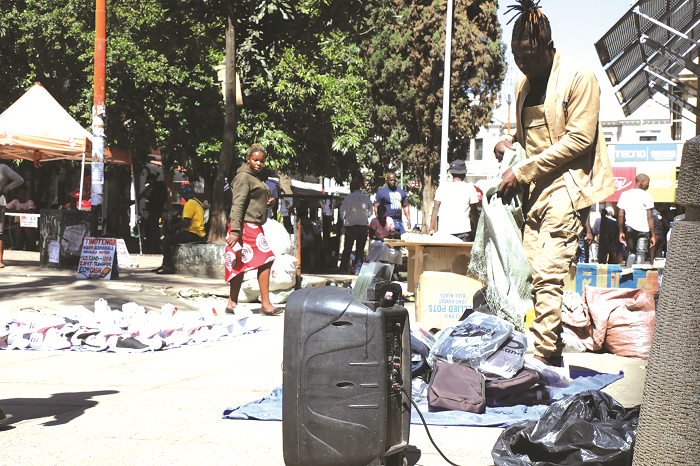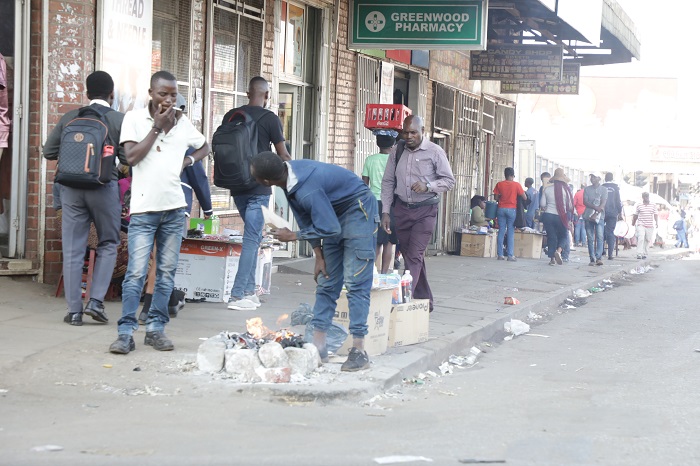
The Sunday Mail

Veronica Gwaze
NOISE pollution has become a common phenomenon in Harare’s central business district (CBD).
Established businesses, vendors and touts are seemingly competing to produce the loudest noise as evidenced by investments in powerful megaphones they use to woo potential clients. Churches have not lagged behind in the vocal contest; they have invested in public address (PA) systems and musical instruments, which they use in their services.
If it is not noise from a church service taking place during working hours, then it will be shouting by vendors, at the top of their voices, or use of loud-hailers to market their wares. Along George Silundika Avenue, close to First Street, there are church services and choir rehearsals that take place at premises close to a building society. The noisy events often take place during working hours on Saturdays or any other day.
A few blocks away, street preachers have a permanent spot at the intersection of First Street and Speke Avenue. They have also invested in PA systems. The charismatic preachers battle it out with a clothes retail shop in the vicinity, which plays loud music throughout the outlet’s operating hours.

Not to be outdone is a vendor who sells pirated music at the intersection of First Street and Jason Moyo Avenue. The seller samples all sorts of songs at the loudest volume possible, without minding the disturbance it causes to others.
Sound pollution is not only confined to the heart of the capital; it gets worse as one moves towards the downtown area.
Statements like “mushonga wemakonzo, wemapete, unouraya ipapo ipapo,” or “mushonga unorapa siki (sexually transmitted infections) yese” from loudspeakers have become common on many busy streets in town.
Public transport operators are also in the mix.

They make all sorts of noise as they tout for passengers while the drivers of the commuter omnibuses unnecessarily sound their horns and rev engines.
“Vape moyo,” the touts will shout as they cheer on.
Both licensed and unlicensed liquor stores have sprouted throughout the city and, in the process, creating perfect platforms for public drinking. Areas around the now defunct Ximex Mall, Angwa Street and Nelson Mandela Avenue; Kwame Nkrumah Avenue (adjacent to the Parkade); and on Jason Moyo Avenue, next to a funeral parlour, quickly come to mind.
The guzzlers are known for their rowdy behaviour and penchant to relieve themselves in public. Thus, the said places and others of a similar nature are now synonymous with a terrible stench and brawls.
The noise pollution in the CBD is disturbing and makes it difficult for those who work in offices.
The chaos, coupled with high rentals, has largely driven most businesses to operate outside the heart of the city.
“Our offices used to be in the CBD. However, we have since moved to Eastlea. The noise in town was becoming unbearable. Some of our clients even hesitated visiting our workplace because of harassment and noise from vendors,” revealed Patrick Mataure, whose company specialises in information technology (IT).
“I think we made the right move considering that we are now paying lesser rentals yet operating in a conducive environment. There is less noise in the new neighbourhood.”
Harare has an ambitious target of becoming a world class city by 2025 but experts opine that this may not be possible if the prevailing chaos is not addressed.
They feel the city is just too noisy and soiled. A dense traffic jungle and hard-to-navigate pavements do not make the situation any better.
Ignorance
Charity Hwema has been in the business of selling pirated music in the CBD for years. She is aware that it is an offence but says she has no other option. So, she is always playing cat-and-mouse with the authorities.
Playing loud music, she reckons, has proved to be one of the best ways to lure potential customers. “I am a widow and have a family to feed, so I have no choice. Sometimes the authorities chase us off the streets but we always return. We face each day as it comes,” she said.
Her colleague, who sells pest control chemicals, said her megaphone is “doing wonders” for her business.
“I used to suffer from headaches because of shouting. However, through this speaker, I no longer have that challenge. I just play a pre-recorded advert of my products throughout the day. My only challenge is that of batteries,” said another vendor, who only identified herself as Petronella.
Her colleague, Chenai Murape (name changed), sells her cell phone accessories from a bag, ready to flee any time the authorities show up. lasting solution to this; they should at least relocate us to another area, where we can safely operate. It is not our intention to operate in undesignated areas, making noise,” she said.
Offence
Harare City Council acting spokesperson Innocent Ruwende said noise pollution is not allowed either in the CBD or residential areas.
“Council respects the right to belong to a religion but we are against noise pollution in the name of the gospel. Churches are disturbing peace in the CBD and some residential areas with their public address systems and musical instruments,” notes Ruwende.
“Churches that use electronic sound systems should soundproof their buildings and those that have been allocated council land should erect permanent buildings, in accordance with the city’s by-laws.”
According to the local authority, use of a megaphone in public to advertise a product, is a violation of by-laws and a punishable offence. Similarly, residents are not allowed to make unauthorised noise in their respective neighbourhoods. If one has to host a party, church service or gather people for whatever purposes, they first have to seek clearance from the relevant authorities, usually the police.
When granted permission, they are supposed to notify their neighbours about the event, well in advance.
The Urban Councils Act, Harare Noise by-Laws SI 195 of 1973, stipulates the forms of prohibited noise.
“ . . . (4) HN 4 (b) Operate or cause/permit to make noise using any instrument for the purpose of advertising, which noise disturbs the peace of the rest of the neighbourhood.
“(5) HN 4 (c) Make noise by shouting or using any instrument which noise disturbs or interferes with the rest and peace of any occupier of the premises in the neighbourhood.
“(6) HN 4 (e) Sound a horn, ring bell, blow whistle, or shout at a public place for the purpose of advertising which noise causes annoyance or disturbance in the neighbourhood . . . ,” reads part of the Act.
Intervention
Local Government and Public Works Deputy Minister Dr Marian Chombo notes the need for immediate restoration of sanity in CBDs.
“We have something in the pipeline to ensure that there are more designated sites for informal traders. However, the issue of liquor stores is a huge concern considering our current predicament, in light of drug and substance abuse,” said Dr Chombo.
“This will be dealt with in a holistic approach because it is everyone’s headache. We should be our own watchdogs, so let us not allow this rot to escalate.”
The Zimbabwe Republic Police said it was working in partnership with relevant departments to bring order in the country.
“There are rogue elements who have a habit of defying authority but the law will always catch up with them. We do not give any preferential treatment to offenders,” said the police spokesperson, Assistant Commissioner Paul Nyathi.
“A number of them have faced the law, with some appearing in courts, depending on the offence.”
National Vendors Union of Zimbabwe chairperson Stan Zvorwadza blames the Harare City Council for the chaos.
With the majority of Zimbabweans operating in the informal sector, he said, structures that cater for this group should be built on council land.
“Harare City Council should fix this mess because it is worsening by the day. They should find alternative spaces for these informal traders.
“It is unfair to just chase them away without plan B. These people are breadwinners, who need to feed their families,” said Zvorwadza.
He added that churches operating in the CBD should be allocated stands elsewhere.
“The authorities need to look at the root cause of these issues to come up with lasting solutions that are favourable to both parties. The mandate of the city council is to create markets for these traders and protect them.
“At some point, we got a potential investor who wanted to invest in a state-of-the-art market and we approached the local authority but they turned the investor down,” he revealed.
“Why do they refuse to accommodate investors or to take ideas from stakeholders? Something is not right here.”
Harare Residents Trust director Precious Shumba said he was more concerned about liquor stores that are sprouting all over the city.
“These (illegal liquor stores) are fuelling cases of drug and substance abuse. In my view, I think the illegal liquor dealers are worse than vendors operating in undesignated areas in the quest to feed their families. The authorities need to engage stakeholders and come up with lasting solutions,” said Shumba.



